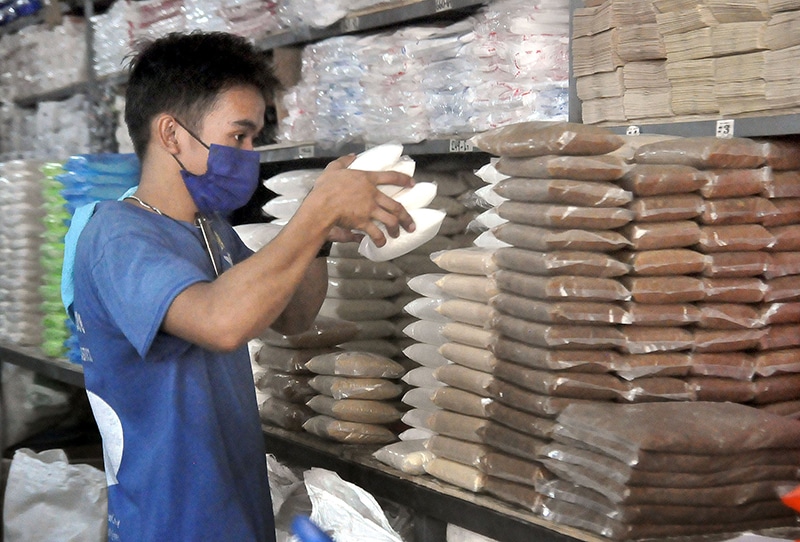By Vince Lopez and Othel V. Campos
Ahead of an expected shortage by August this year, the government has approved the importation of sugar to stabilize its supply — and is considering a similar move for onions to bring down prices.
President Ferdinand R. Marcos Jr. approved on Monday the additional importation of up to 150,000 metric tons (MT) of sugar to augment the country’s supply and stabilize the price.
“We agreed to additional importation of sugar to stabilize the prices.
[The] maximum amount will be 150,000 MT but [it will] probably less,” President Marcos said after meeting with Sugar Regulatory Administration (SRA) acting Administrator Pablo Luis Azcona and board member Ma. Mitzi Mangwang, representing sugar millers.
“The exact amount will be determined once we have determined the exact amount of supply, which will come at the end of this month,” Marcos said.
He added that the government is opening the importation of sugar to all traders.
The SRA forecasts that the country will have a negative ending stock of 552,835 MT by the end of August 2023, the end of the milling season, and it will be necessary to import 100,000 MT to 150,000 MT to avert a shortfall.
The SRA said that as of May 7, 2023, the country had a sufficient supply of raw sugar with a beginning stock of 160,000 MT.
However, the country will still need to import an additional 100,000 to 150,000 MT of sugar by this year because the expected local production of 2.4 million MT and the imports authorized so far will not be able to cover the 3.1 million MT demand.
Sought for reaction, the county biggest group of exporters said it is the prerogative of the President to decide on matters of national security, especially on food security given the latest economic data.
“While mostly everybody has their our interest or opinion on the matter of importation, I personally think that the President has all the information and appropriate appreciation of the facts and so is in the best position to decide on this matter,” said PhilExport president Sergio Ortiz-Luis.
Food processors and exporters “agree with the President’s move,” said Hi-Las Marketing CEO and president Roberto Angelo Amores II.
“The importation hopefully would result in more reasonable prices for sugar locally so we as processors and food manufacturers can remain competitive in both the local and foreign markets. We hope that members of PHILFOODEX will be given allocations for the inbound sugar,” he added.
However, sugar farmer and former SRA Administrator Lito Coscolluela lamented the lack of transparency in government procurement, “unlike in the past when all legitimate stakeholders are consulted for every proposed or planned importation.”
“We think the government should exhaust the entire 440,000 MT sugar importation under Sugar Order No. 6. Then they should show the math based on realistic figures before plunging into another import scheme,” Coscolluela said.
“The government should better recheck their figures with some quarters saying that demand is at 3.1 million metric tons (MT) while production barely hits the spot at 2.4 million MT,” he added.
Sugar farmers see local refined sugar demand at 36 percent lower compared to the same period in 2023, while a substantial drop is seen in refinery withdrawals in 2023.
More imports will hurt these refineries and possibly depress domestic sugar buying when milling resumes, Coscolluela said.
Meanwhile, the Department of Agriculture (DA) said it is studying all options, including importing the commodity, to lower the cost of onions.
In a television interview, DA Assistant Secretary Kristine Evangelista said they are coordinating with onion farmers to determine how they could lower the farmgate price, which currently stands at P100 to P120 per kilo.
She said a farmgate price of P100 a kilo would already give farmers their margins.
Evangelista also said the DA must monitor the movement of onion stocks in and out of cold storage facilities, and check ports and markets to determine if there are smuggled onions being sold.
Azcona told the President that with the issuance of SO No. 6, sugar farmers are happy because they are benefiting from the stable farmgate price of raw sugar, which is averaging at P62/kg for the current crop year. This is higher than the P38/kg average farmgate price in CY 2021-2022.
To improve productivity, Marcos said he also approved moving the start of the milling season from August to September this year, saying this would result in a production increase of about 10 percent.
Azcona said opening the milling season in September will improve raw sugar recovery because it will minimize the milling of young canes.
The President also ordered the SRA to expedite block farming initiatives to increase production. Block farming is a system by which small farm lots are consolidated into at least a 30-hectare block farm. There are currently 21 block farms in the country averaging at least 40 hectares each.
Once organized into block farms, farmers are entitled to financial and mechanization support for increased production. The President pointed out that consolidation is an important part of agro-industrial production.
“We’re looking at increasing the budget for block farming to accelerate the process of organizing the block farms,” he said.





